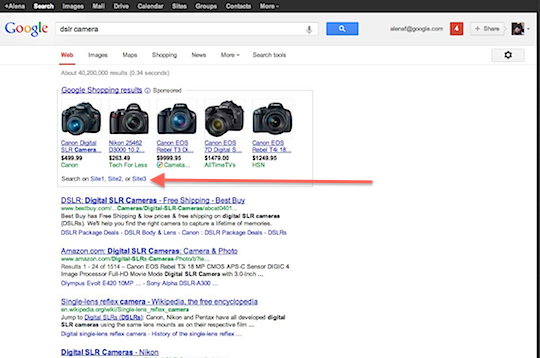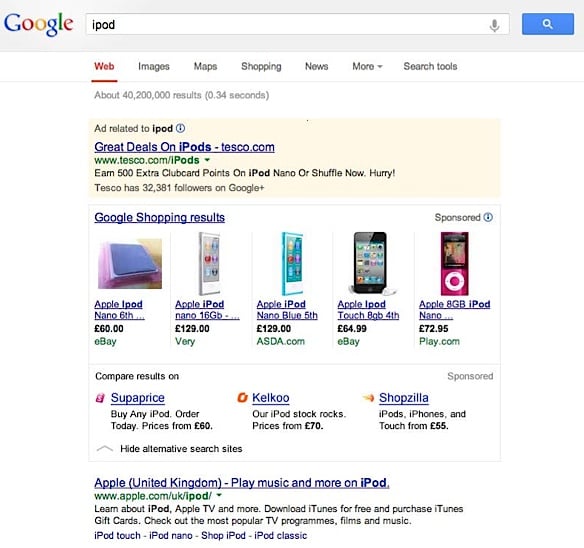This article is more than 1 year old
Google WILL wriggle away from Euro probe... but THEN what?
Turning monopoly into new revenue stream
Google’s remedy
Google wants the EU to back off for five years, the duration of the agreement. To address the vertical search complaint, Google would create a box no larger than 10 per cent of a web page, where it would permit up to three ("or as many sites as qualify from this process, if fewer than three") "Rival Vertical Search Sites" to display prominently in the search results. Google, not an independent regulator, would determine the criteria for inclusion with a complex set of rules.
Major sites like Amazon and eBay couldn't use them, for Google doesn't want merchants to be included. Instead, Google only wants to permit popular sites, which are already in the Top 500 most popular websites, to be allowed in. (Google wanted to use Amazon subsidiary Alexa to determine eligibility, but the latest proposal has widened this to allow rankings from the rather more credible Nielsen and comScore ratings companies).
The Top 500 rule sets the barrier high for startups. It effectively insulates Google from bright new companies with good ideas. A startup would have to scale very rapidly too - by which time Google’s own engineers could have developed their own startup-crushing competing service.
It’s slightly surprising that this hasn’t yet caused any controversy. Google wants politicians to think that it's a nurturing, positive host to new businesses; when Google opened its "Campus London" building in 2012, it explained that it was “filling this town with start-ups”. But in practice Google favours legislating them into a structural disadvantage.
Google also makes the inclusion criteria for the "Rival Vertical Search Sites" restrictive in other ways, for example "Applicant sites must ensure Rival Links bring users directly to search results pages that are responsive to users’ queries, without interstitials or prompts before the display of the search results."
What do these boxes look like? Here’s what Google proposed in April.

Spot the rival. Google's April proposal turned rivals into small print - literally
A lab study by Professor Lewandowski and Sebastian Sünkler (PDF) at Hamburg University into how users actually responded to these found that most users couldn’t find the non-Google vertical search options even when directed to them. Perhaps not surprisingly, since the small text-only link looks like a disclaimer. The latest Google proposals add more branding detail to the verticals sites that have successfully participated in the auction.
Here are the modified proposals.

Cosmetics aside, the most disturbing aspect of the proposals for competition experts is the requirement that Rival Vertical Search Sites would need to pay to for prominence in the Vertical Sites Pool.
Vertical search companies – who already have to satisfy the Top 500 criteria mentioned above – would then be obliged to bid in an auction in which Google sets the minimum price. This contrasts with the European Commission’s “Browser Ballot”, devised to provide users with more choice in response to Microsoft bundling Internet Explorer with Windows. In the Browser Ballot, inclusion is free and the order in which the choices appear is randomised.
The auction is similar to that which takes place for AdWords auctions, with a minimum cost-per-click threshold of €0.03. Of course, as Google magnanimously points out, "if nobody clicks on a particular Rival Link, no payment will be due".
This fee is highly controversial. Before Google started to favour its own properties, it simply displayed organic search results in which the most "fresh and relevant" sites were rewarded with a high ranking. Now they must pay to play, or be excluded completely.
But as one critic points out, Google has pointed out “making the boxes bigger and decorating them with logos might increase the click-through to rival sites, but at the same time it will increase the profit Google [gathers] from everyone else on the web: competitors and ultimately consumers.”
In Google’s latest proposal, users would be able to hide the rivals with one click permanently. According to European publishers, the proposal is "helping Google advance its business strategy to transition free organic search into paid search".
In response to Google’s latest proposals, the European Commission has sent out a questionnaire. However the scope of the questions does not include rejecting the fundamentals of the deal. "Please provide an analysis of the visibility of rival links," the EC asks vertical search companies, for example. "Does the shading of search results affect the click through rate on that result?" asks another question. These are cosmetics.
The relationship between Competition Commissioner Joaquín Almunia - a former economist for a large Spanish trade union - and Google chairman Eric Schmidt has already been the subject of concern. Almunia pre-empted a full antitrust investigation by attempting to allow Schmidt to make voluntary concessions. The two chat by text. Last week privacy advocate Simon Davies formally requested the communications to be disclosed to the public, along with meeting minutes and briefing notes.
If it transpires that in its eagerness to strike a deal with Google, the Commission lost sight of its mission to promote competition, things could get messy. ®
